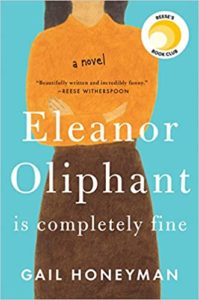
Eleanor Oliphant Is Completely Fine
By Gail Honeyman
352 pages
Published in 2017 by Penguin Books
The plot of Eleanor Oliphant Is Completely Fine is almost a cliché of romance novels and high school movies – the neglected and sometimes shunned Plain Jane that blooms as she opens herself up to love.
That may be too harsh. It might be better to say that in writing Eleanor Oliphant Is Completely Fine, Gail Honeyman works from a relatively recent sub-genre that is best exemplified by the “Bridget Jones” novels.
But I’m happy to say that there is a lot more going on than just that.
The main character, for one. The novel is written in the first person. Eleanor, the narrator, begins her story without any sense of how she sounds or appears. She is intelligent and well educated. She is also extremely judgmental. Her sheltered childhood has traumatized her to the point that she seems like a Victorian woman with Asperger’s transported into the 20th century. It is this perspective that makes her lovable and relatable and provides for a stream of laugh-out-loud interchanges throughout the book.
There is also quite a bit of satire throughout – targeting everything from office politics to wedding rituals to hipster clothing and bikini waxes. And there is a darker story that runs behind it – of childhood and other abuse. But to Honeyman’s credit, this is never overdone. It adds some depth, but no more than the plot could bear.
I wouldn’t call Eleanor Oliphant Is Completely Fine a novel for the ages – but at the least, it is smartly funny entertainment, and at its best it reminded me of a Jane Austen novel. Which is about as good as novel writing gets.
Critical Reviews
“A charmer… satisfyingly quirky.” (Janet Maslin in The New York Times)
“This wacky, charming novel… draws you in with humor, then turns out to contain both a suspenseful subplot and a sweet romance…. Hilarious and moving.” (People)
“Sweet and satisfying, Eleanor Oliphant Is Completely Fine will speak to introverts who have ever felt a little weird about their place in the world.” (Bustle)
“Debut author Honeyman expertly captures a woman whose inner pain is excruciating and whose face and heart are scarred, but who still holds the capacity to love and be loved. Eleanor’s story will move readers.” (Publishers Weekly)
 MarkFord
MarkFord
